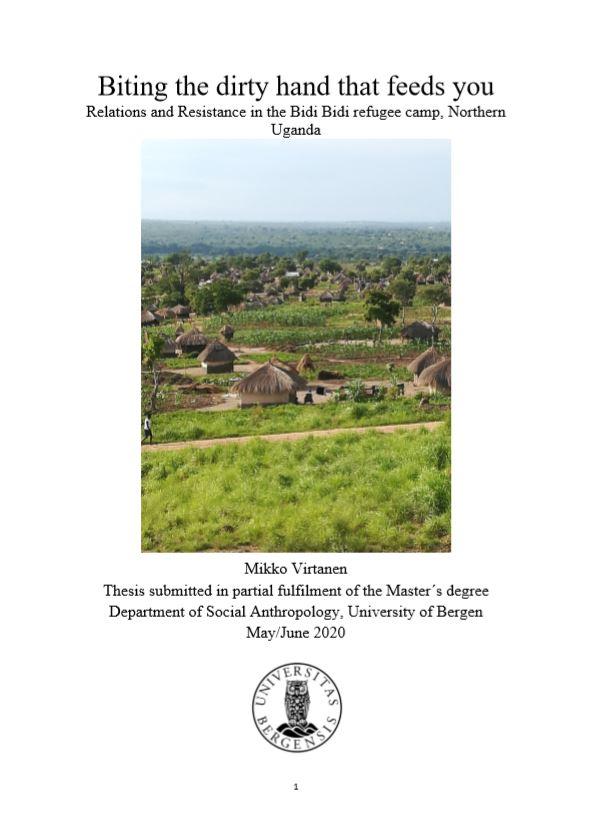Biting the dirty hand that feeds you Relations and Resistance in the Bidi Bidi refugee camp, Northern Uganda
Hovedinnhold
Master's thesis submitted at Department of Social Anthropology, spring 2020.
By: Mikko Henrik Mæland Virtanen
Supervisor: Professor Bjørn Enge Bertelsen
In this thesis I address certain central aspects of the relations between what I define as different parties within the Bidi Bidi refugee camp. Based on fieldwork in and around the camp in 2019, I have analytically separated these parties into three as I see these as fundamentally striving towards different aims and, crucially, also often oppose each other, openly or covertly. In my analysis the humanitarian organisations and the Ugandan government comprise one party. The refugees and the local population constitute the two others. In my thesis I argue that the relations between these three parties are fundamentally driven or shaped by acts of resistance within a triangulated form of power relation. Furthermore, as I present the different parties it becomes evident that the humanitarian organisations and the Ugandan government comprise the most powerful party in the triangle, causing its shape to be lopsided rather than even. My triangulation, therefore, does not imply a horizontalization of relations but, rather, seeks outline also vertical relations of power. Concretely, I argue that the Ugandan government and the humanitarian organizations maintain this powerful role by controlling different forms of distribution, and being in charge of food, supplying jobs and giving courses. Through these practices they also produce various forms of governmentality which is supposed to make the refugees able to govern themselves the way the humanitarian organisations and the Ugandan government want. Throughout the thesis I also present multiple cases of both open and hidden forms of resistance by all three actors. I argue that even the humanitarian organisations and the Ugandan government are acting resistant towards the other parties through both acts of governing and disregarding acts committed by the other parties. I argue that, analytically, it is illuminating to see all these acts as resistant as it is the power of an actor that is resisted. The main party these acts effect are the refugees. I further argue, based on hospitality theory in anthropology, that despite the power of the Ugandan state and the humanitarian organizations, the de facto host community are still the main host in the everyday life in the camp. Crucially, they also practice both hospitality and resistance and, again, the one does not exclude the other. I then further argue that these resistant acts between the parties are the relations defining feature and, in this way, describes the relation between the parties well. With this argument I wish to argue that refugees can be empowered and that they don’t have to be treated as they are in many countries. Looking closer at the relations between the parties, I believe it can be possible to find a solution to improving refugees situation in many countries.
